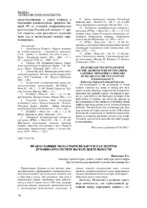Православные монастыри Беларуси как центры духовно-просветительской деятельности
Another Title
Orthodox monasteries of Belarus as centers of spiritual and educational activities
Bibliographic entry
Панченко, Т. А. Православные монастыри Беларуси как центры духовно-просветительской деятельности = Orthodox monasteries of Belarus as centers of spiritual and educational activities / Т. А. Панченко // Архитектура : сборник научных трудов / редкол.: А. С. Сардаров (гл. ред.) [и др.]. – Минск : БНТУ, 2020. – Вып. 13. – С. 30-36.
Abstract
Православная Церковь всегда являлась важным фактором в формировании мировоззрения и системы ценностей как отдельного человека, так и общества в целом. Она сохранила свою роль в современный период, возобновив свою деятельность в нашей стране после 1989 года, развивая различные формы социальной, просветительской и миссионерской деятельности (служения). В статье освещён исторический опыт генезиса наиболее распространённого типа православного духовно-просветительского центра на Беларуси – общежительного монастыря.
Abstract in another language
For the sustainable and harmonious development of the Belarusian society in the current situation of changing ideological orientations, worldview paradigms is particularly important and understanding the Church is in demand as a real factor in the life of a modern person, on the one hand, and rethinking its role in new social and ideological conditions, on the other hand. In the general historical and cultural context, the developed religious consciousness to a large extent was the basis of spirituality and statehood. The most complete and consistent transfer of traditional national and religious values and in general, the influence of the Belarusian Orthodox Church has always been carried out thanks to its broad educational, spiritual and educational activities. Traditionally, the most important role of the Church in the formation of personality and society, the expansion and change of functional programs of objects and complexes, causes the need to understand the architectural and urban practice of the historical experience of social service of the Orthodox Church.

